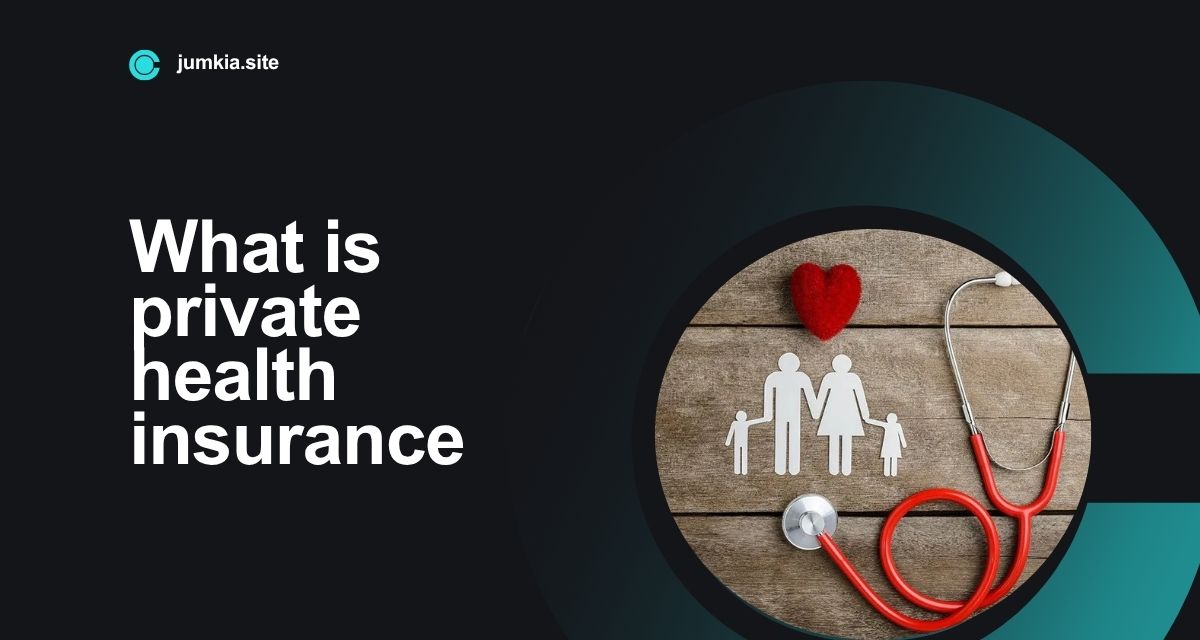Table of Contents
I didn’t understand private health insurance before, but this article helped me a lot. It explained everything in easy words, from how it works to why it matters. I realized it can save money during medical emergencies.
Private health insurance is a plan you buy to help cover your medical costs. It gives you more choices for doctors, faster treatment, and extra benefits. You pay a monthly fee and the insurance helps with hospital bills, checkups, and medicines.
In this article, you’ll learn how private health insurance can give you better care, more choices, and peace of mind.
What Is Private Health Insurance?
Private health insurance is an individual or employer-bought plan that pays for medical treatments, hospitalization, doctor visits, prescription medications, and other related healthcare expenses. Rather than turning only to government or public health care, you pay an annual or monthly premium to a private company.
As a result, the insurance subsidizes expenses when you go to the doctor. You have various types of plans to pick from—such as HMO, PPO, or high-deductible that are tailored to your requirements.
The most significant advantage is choosing doctors and hospitals and generally enjoying shorter wait times and more options.
Why Private Health Insurance Counts
Private health insurance counts because it provides you with control over your health, convenience in getting care, and peace of mind. In contrast to fixed rules and waiting times associated with public systems, private plans provide swift access to experts, elective surgery, and diagnostic tests.
Should you experience a medical problem, insurance prevents you from breaking the bank and insulates you from financial shocks due to costly treatment.
Whether you’re preparing for maternity, chronic illnesses, travel health, or mental health care, a quality private plan provides you with cover.
Who Can Benefit from Private Health Insurance?

Private health insurance can be beneficial for many individuals. If you are self-employed, self-insured, or do not receive coverage from an employer, a private plan covers gaps in public systems. Parents with children commonly opt for private insurance to obtain pediatric care, dental, or vision treatments.
Travelers and expatriates take advantage of global plans that cover urgent care no matter where they are. Even young, healthy young adults may value supplemental coverage if they prefer having flexibility and the ability to access preventive care.
And high-income individuals or those with special medical requirements can tailor coverage way beyond what public programs provide.
Why Do People Choose Private Health Insurance?
- Enhanced Comfort and Privacy: Private hospitals often offer private rooms, more flexible visiting hours, and a higher level of comfort and personalized care compared to public wards.
- Access to Specialized Treatments: Some private policies may cover treatments or medications that are not readily available or fully covered under public healthcare systems.
- Peace of Mind: Knowing you have comprehensive coverage for unexpected medical events can provide significant peace of mind, especially if you have a family or a pre-existing condition.
- Specific Needs (e.g., Dental, Optical): While some public systems offer limited coverage for these, private health insurance often provides more extensive benefits for dental care, optical services, and other ancillary treatments.
- Employer Benefits: Many employers offer private health insurance as part of their employee benefits package, making it an attractive perk.
What Does Private Health Insurance Cover?
Private plans differ, but most include these essential services: hospitalization, including surgical suites and ICU; outpatient visits with primary and specialty physicians; prescription drugs, usually tiered according to cost; preventive care such as health screening and vaccines; diagnostic services, such as X-rays and MRIs;
Maternity and newborn care; mental health services such as psychiatry and counseling; and rehabilitation such as physiotherapy. In addition, most insurers include add-on benefits like dental cleaning, vision exams, alternative treatments (e.g., chiropractic or acupuncture), and wellness benefits like gym memberships or nutrition guidance.
How Much Does Private Health Insurance Cost?

Your age, region, plan type, and deductible amount are just a few of the many factors that affect the cost of private health insurance. Typically, younger individuals have lower premiumssometimes as low as $200 to $400 a month while older generations or families.
High-deductible policies lower your premiums but make you pay out more in annual deductibles after a claim. In contrast, comprehensive policies with extensive networks, reduced out-of-pocket spending, and additional benefits are pricier.
How Does Private Health Insurance Work?
Deductible/Excess:
This is a fixed amount you must pay out-of-pocket before your insurance coverage kicks in. For example, if your deductible is $500, you’ll pay the first $500 of your medical bills, and then your insurer will start covering the rest (up to your policy limits).
Co-payment/Co-insurance:
This is a percentage of the medical cost you’re responsible for paying even after your deductible is met. For instance, you would pay $200 and your insurer would pay $800 if your co-insurance was 20% and your bill was $1,000 after your deductible was satisfied.
Out-of-Pocket Maximum:
This is the maximum amount you’ll have to pay for covered medical services in a given year. Once you reach this limit, your insurance company will pay 100% of all covered costs for the rest of the policy year. This protects you from catastrophic medical expenses.
Benefits/Coverage:
These are the specific medical services and treatments that your insurance plan will cover. This can range from basic hospital cover to comprehensive plans that include dental, optical, physiotherapy, and more.
Exclusions:
These are certain medical diseases or treatments that are not covered by your coverage. Common exclusions might include cosmetic surgery, experimental treatments, or pre-existing conditions (though rules vary by country and policy).
Waiting Periods:
For certain benefits, particularly for pre-existing conditions or major procedures, insurance companies may impose a “waiting period” during which you cannot claim for those services. This keeps people from enrolling only when they require costly medical care.
How to Select the Right Plan
To select the right plan, begin by analyzing your health care needs: Do you see specialists frequently, Do you require maternity, mental health, or dental coverage, Consider your budget are you willing to pay more premiums for peace of mind, or do you want lower cost with greater out-of-pocket spending.
Examine the annual costs and advantages offered by various insurance companies. Finally, don’t be scared to ask specific questions of brokers or agents. Annual open enrollment is a great time to switch plans if your needs or providers change.
Private and Public Health Insurance
Public insurance a governmental health system—is usually low-priced or no-cost but restricts provider selection and has increased waiting times. Private insurance is more expensive but returns with quicker access, larger provider networks, and adaptable plan options.
Public programs tend to provide typical levels of care; private plans enable you to tailor coverage for mental health, maternity, dental, or foreign travel. While public insurance is subsidized by taxes, it can have waiting lists for certain procedures.
When You Might Not Need Private Coverage

If you are young, in good health, and don’t use healthcare services often, a high-deductible plan combined with a Health Savings Account (HSA) might be all you need. In nations with good public health systems, vital health care can be covered adequately without private policies.
Budget considerations also come into play: private coverage is only worthwhile if you have enough money to pay yearly premiums and potential deductibles. If the public plan already covers important services such as maternity or specialist care.
FAQs:
How to Get Private Health Insurance
Begin by comparing plans online—either on insurer sites or independent brokers’ websites. Note down your current doctors, medications, and care requirements. Complete an application form with your personal information and medical history.
Private Health Insurance and Global Coverage
When abroad on business or leisure, international private health plans can be a lifesaver. Some global plans cover treatment in several countries and provide access to foreign hospitals and physicians. They usually include evacuation coverage in the event of medical emergencies.
Pre-Existing Conditions Covered by Private Health
In the case of those with a pre-existing health condition, insurers will often impose a waiting period 6 to 12 months, whereas expenses for that condition are not covered, though other coverage is ongoing. Insurers can impose premium loadings, additional premiums to compensate for risk.
Final Thoughts:
Private health insurance provides you with freedom of choice over care, quicker access, and protection from significant medical expenses. It does, however, involve making complicated choices, dealing with deductibles, and paying premiums. Selecting the ideal plan involves weighing your health requirements, financial capacity, and coverage needs.










